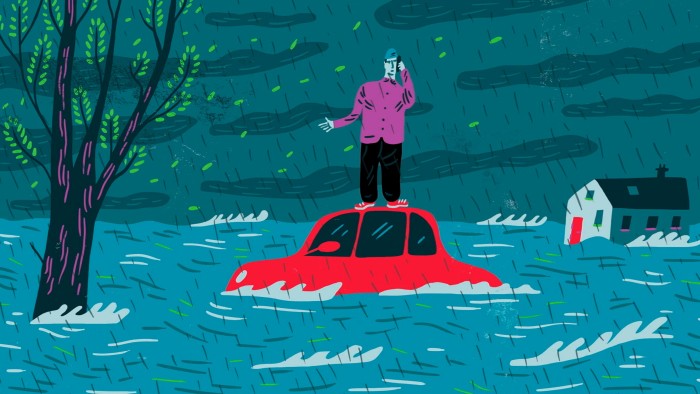Unlock the Editor’s Digest for free
Roula Khalaf, Editor of the FT, selects her favourite stories in this weekly newsletter.
Insurance is based on a simple idea: pay a small, predictable price today to avoid facing a devastating surprise bill tomorrow.
As you take on more responsibility, from renting a car on holiday to signing a lease for your first apartment, insurance can provide crucial financial protection.
Mastering Money
This article is part of Mastering Money, an FT Schools report for students and teens on how to make good financial decisions. Other articles cover important decisions, budgeting, investing, and social media.
For more on the FT Schools programme, which offers free FT access as well as teaching resources, click here.
Insurance companies gather premiums (small, regular payments) from lots of individuals, families and businesses. That pool of money covers the rare but expensive losses that hit one or two members of the group.
Essentially, you transfer the financial risk of a disaster — from a car crash to a flooded basement — to the insurance company, in exchange for predictable costs.
What insurance you might need Motor
Many young people first encounter insurance when they learn to drive. Auto insurance helps cover repair bills, medical expenses and legal fees if you cause an accident.
In many countries, you cannot legally drive without at least third-party coverage, which pays for damage you cause to others. Comprehensive coverage, which also pays for damage caused to yourself or your vehicle, is more expensive.
Auto insurance for young people can be very costly. You can save money by installing telematics equipment (sometimes called a black box) in your vehicle. If you prove you are a safe driver, the insurance company might charge you less.
Home
People who own their own homes can buy buildings insurance, which covers repairs that may be needed following a disaster, such as a new roof after storm damage.
Home contents insurance can be a smart buy for renters, since policies for landlords’ buildings will not protect your laptop if thieves break in. Contents insurance covers your possessions — phones, TVs, bikes — if they’re stolen, damaged by fire, or ruined in a flood.
Health and life
Private health insurance is another essential in many parts of the world, and is becoming more popular in European countries where public healthcare systems have come under strain. This can get you quick treatment with a specialist if you fall ill.
Life insurance, meanwhile, is a tool to protect loved ones who depend on you for support. It takes lots of forms. Some types pay your dependants if you die; others pay you money if you become seriously ill and can no longer work.
Travel
Travel insurance policies can reimburse you for cancelled flights, lost luggage, theft of valuables or unexpected medical expenses abroad. It can also sometimes cover you if you have to cancel the trip.
Know the jargon
Policy Your contract with an insurance company. The policy documents will explain in what circumstances the insurer will pay you.
Premium The amount that you pay for the policy.
Claim When you ask the insurance company to pay you because of something that has happened eg a car accident.
Excess or deductible The amount of any insurance claim that you have to pay. If you claim £1,500 and have a £100 excess, the insurance company will pay you £1,400.
What else insurers cover
Consumers are just one part of the insurance industry’s vast client base. Companies use insurance too, to cover the risks they face.
Football clubs, for example, take out insurance policies on athletes’ body parts — putting a price tag on a star player’s legs, and helping to guard against the financial risk of career-threatening injuries. Pop stars like Taylor Swift, or their management companies, may buy event cancellation insurance, so that they are not on the hook in case of a last-minute change.
Insurance policies also allow innovators to take on challenges.
“Entrepreneurs want to take risk, but the majority of human beings worry about what could possibly go wrong,” says Caroline Wagstaff, chief executive of the London Market Group, a trade body for insurers. “We say, we can help protect you when things go wrong.”
What to look for when you buy
Being a smart insurance buyer requires close attention to the fine print, and comparing policies to make sure you get the right fit.
Make sure to carefully describe the things you want protected — your car’s make and model, the value of your gaming console, or the length of your vacation. Entering cheaper values can leave you without enough cover if something goes wrong, while exaggerating them may inflate your premiums.
Smart buyers also look at the policy details when comparing prices. A budget home insurance quote may seem cheap, until you discover it excludes water damage or theft. Read the policy summary to check coverage limits and exclusions.
When comparing the prices offered by different insurers, focus on total cost including fees; deductible or excess levels (the amount of any claim that you have to pay before the insurer pays out); and add-ons like legal cover.
Comparison sites and brokers also help to screen providers. Websites are convenient, but if your situation is complex it might be worth finding a broker who can tailor cover to your needs.
Three questions to ask before you buy
What’s not covered?
Every policy has exclusions, so it’s important to read the fine print.
How much is the deductible?
The deductible (or excess) is what you will need to pay towards any claim. A lower premium often means a higher excess.
How do I change or cancel my policy?
Your needs can evolve. Check whether you can adjust your cover, and if you would be penalised if you cancel early.

